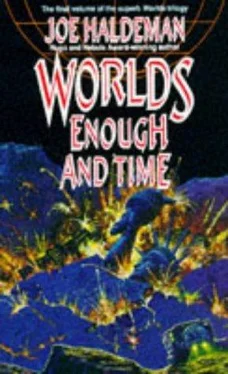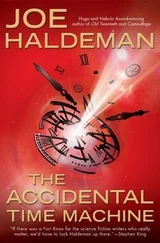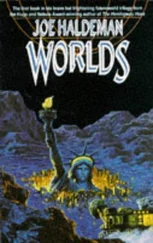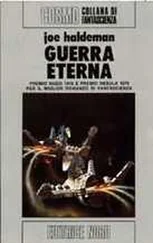“And this guy’s craziness was infectious?” Sam said.
Hagen nodded. “Or maybe it just jogged people’s memories, to be fair. But people who had initially said it was like a dreamless sleep later came up with descriptions of dreams, even nightmares, that came and went for a half-century.
“It doesn’t seem likely at all, since during suspension there’s almost no electrical activity in the brain. Any normal patient who came up with the signs of a cryptobiote would go straight to the recycle chute. Waking them up is like reviving the dead, except that these are dead people who’ve been specially prepared.”
“I heard they can even survive exposure to vacuum,” O’Hara said.
“The animals have; we never did the experiment on humans. And they can handle ten thousand times as much hard radiation as we can. They’re basically inert. Dried-out mummies.”
“How were they mentally when they came out?” Sam said. “Besides the crazy one.”
“Of course we gave them standardized tests, before and after. They all came in within the predicted standard deviation—even the crazy one. His problem was emotional, not mental. And I’m sure that problem was firmly in place before he volunteered. Getting freeze-dried didn’t cause it.”
Dan checked his watch. “So what would you like us to do for you? Don’t be realistic—if we had all the power people seem to think we have, what could we do?”
Hagen smiled politely, tiredly. “Like everyone, we need more information specialist help. Reconstructing our library. Beyond that… I guess the main thing would be to move us up the totem pole of priorities. Both Engineering and Policy. We’re treated like some exotic biotech specialty—which was true enough before Launch. Now we’re actually more a part of Life Support.”
“I’d go along with that,” said Aaron Busch, Marius Viejo’s assistant director. “If you want, I’ll talk to Marius about a connection at some level—not so close as to give all of us one vote instead of two, but at least some way we could lend you more visibility. Everybody’s always worried about Life Support.”
She hesitated. “I’d appreciate that.”
“Call you tonight after I talk to him.”
Coordinators rarely showed up for these presentations, since they had plenty opportunities to rain on people’s parades without volunteering for more, but there was one woman from Eliot Smith’s office, Kara Lang. “I wish we could help you with the information people,” she said, “but you really are pretty low on the totem pole. Not because we think your work is unimportant. It’s just that in terms of functionality…” She paused, groping for jargon. “The part of your program that’s really important to us overall is that practical lifeboat function. The technology supporting that is completely automated, as you say, and the fact that it’s seventy or eighty years old just increases our confidence in it.”
“But it isn’t adequate! If some emergency forced us into the tanks right now, seventy-five percent of the ones who went in would probably survive—but thousands of people wouldn’t be able to go in; the young and the old. Some of the elderly are our most valuable resources. Your own boss would be a borderline case.”
“I’ll point that out to him. But I know what he’ll say.”
“Women and children first,” Dan said. “Damn the torpedoes, full speed ahead.”
“Something like that.” She pointed at O’Hara. “Marianne, how many information people have you seen in the past two weeks, the past month?”
“None. None since July.”
“See? Now I personally put a high priority on reclaiming Shakespeare and Mozart and Dickens. But we do want to have an audience around to enjoy them. That means that all but a handful of the information people are sweating it out in Engineering. Once all the repair manuals are reclaimed, we can push in other directions.”
It went on like this for some time. O’Hara followed the bickering with interest, but she was more interested in the bickering—good and bad techniques—than the subject matter.’ It wasn’t especially relevant to her personally. Those cryptobiotes that had frightened her as a child, emerging from a half-century’s darkness wrinkled, wet, confused; they had made up her mind about suspended animation.
She would rather take a deep breath and step out the airlock.
15 August 99 [25 Muhammed 295]—I’m not often at a loss for words, but when Sam gave me a present today, I really didn’t know what to say. A beautiful gift.
I should note for you generations yet unborn that gift giving is necessarily rare in this pseudoeconomy, at least gifts of objects. We were allowed to bring aboard only two kilograms of personal items. Otherwise, everybody owns everything equally.
You can make things, though. The computer keeps a running list of objects scheduled for recycling; if you can find a use for something that’s broken, you can petition to intercept it. So Sam collected bits and pieces over the months and pieced together a musical instrument, a kind of harp. It’s an arched trapezoid, the sides and bottom made of shiny metal stock. The curved top is a piece of golden wood, from Earth. From New York, where in a desperate time we had been lovers.
I supposed we would be again, another thing that left me temporarily speechless. We had been working together for most of a year on the literature project, and he had never hinted at anything romantic—though I had, at least to the extent of making sure he knew I was not unavailable. He was always reticent about sex, though, even when we were doing it.
He wanted more than that. He wanted to marry me; join the line.
I told him I had to think about it, and then talk to him, and then ask the others. It had to be unanimous, and I wasn’t sure that Dan or even John would go along with it. I wasn’t even sure that I wanted it, as dear as Sam is to me.
He kissed me and left me alone there in the editing room. I came up here to think into the keyboard.
So much of the literature we’ve been trying to reclaim or recall has to do with love. Old-Fashioned romantic love, often, with its sinister subtexts of ownership, male superiority, female manipulation. A sexual and emotional union that not incidentally reinforced the power of the church and the state over individuals and families.
I guess my first love, with Charlie Increase Devon, involved a strong element of that. Maybe he also cured me of it. Or maybe it was like other childhood diseases, that you contract once and then become immune. Even as I wrote that down, I saw how silly it was—some people never experience romance and some never grow out of it—but I’ll leave it. I’m going to erase all this anyhow.
Could I love a third man without diminishing what I have with the other two? I wish we had more precise words for love, dozens of them, like the Eskimos supposedly had for snow. I do already love all three of them, in three distinctly different ways. Daniel needs me and I need to nurture him, protect him. John is my comforter, and still my mentor. (People who don’t know us well would probably assume that the relationships went the other way, because of John’s deformity. But I don’t even see it anymore, except as a sign of the patient strength, the calm acceptance, that drew me to the man in the first place.) And what about Sam?
On Earth, where we were working with groundhog survivors, he saw how upset I was when Daniel and John called down to ask me to allow Evelyn to join our line. I knew and liked Evy but resented the timing, the handicap of not being there to physically confront them. I would have said yes anyhow, so I gave permission as gracefully as I could. As soon as the comm link was broken, though, I started to mope and growl and bitch. Sam offered himself and I jumped his lanky bones.
Читать дальше












